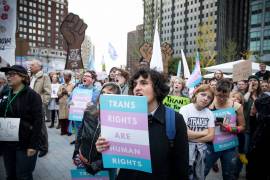
Prop 8 Update: Will Marriages Be Back in California Soon?
Blog Search
The U.S. Supreme Court may announce soon whether or not it will review the Prop 8 case seeking to strike down the ban on the freedom to marry in California. (The case, brought by Ted Olson and David Boies, was previously known as Perry v. Brown, but is called Hollingsworth v. Perry at the Supreme Court level.) If the Court accepts the case for review, we will all have to wait for oral arguments and the Court’s decision, which likely would be issued by June 2013.
But if they decline to take the case, then the prior federal court decisions striking down Prop 8 will be affirmed. If that happens, the freedom to marry will be restored in California!
Here’s what might happen:
The Perry case is set for consideration at the justices’ conference on September 24, and the Court could announce as early as September 25 whether it is hearing the case. However, it is possible that the Court may wait to decide whether or not to hear Perry until it decides whether or not to hear any of the challenges to Section 3 of DOMA. So, we may not hear about Perry until October 9. It could even be later than that, if the Supreme Court decides it wants more time to decide what to do.
If the Court announces that it will not hear the Perry case, it will be very exciting news for same-sex couples in California!
But the timing for what happens next is a little bit complicated:
The Ninth Circuit's merits opinion in Perry of February 7, 2012, stated that "the stay pending appeal issued by this Court on August 16, 2010, remains in effect pending issuance of the mandate." (A "mandate" is the appellate court's order sending the case back to the District Court.) The Ninth Circuit's June 5, 2012, order denying rehearing en banc then said, that "the mandate is stayed for ninety days pending the filing of a petition for certiorari with the Supreme Court. If such a petition is filed, the stay shall continue until final disposition by the Supreme Court." In other words, it is the mandate that is stayed until final disposition of the Supreme Court. Once the Supreme Court either denies certiorari (that is, declines to hear the case) or accepts the case and ultimately decides it, then the mandate can issue. It is once the mandate issues that the stay of the injunction is lifted.
It is very likely that the Ninth Circuit will act very quickly to issue its mandate once the Supreme Court either denies certiorari or accepts the case and thereafter decides it. I think it would only be a couple of days, and maybe even less than that. Once the Ninth Circuit issues the mandate (and there will be an order stating that it has), then the injunction against enforcement of Proposition 8 will be in effect and there will no longer be any legal barrier to marriage for same-sex couples in California.
It is possible that, in that very short window period, some local officials will be willing to issue marriage licenses to same-sex couples. Hopefully, state officials will issue advice prior to that, clarifying the above information for them. If a same-sex couple marries before the mandate issues, there would be some potential for someone to later argue that the marriage was not valid. I think such an argument would fail (because a refusal to have allowed them to marry would have been unconstitutional) but, as we saw in the Lockyer decision (after then-Mayor Newsom allowed same-sex couples to marry), there are questions about the authority of local government officials to act before litigation is fully resolved, which here might be argued not to occur until issuance of the mandate.
Given that Prop 8 at that point will have been permanently struck down, there will not be a need for most couples to rush to get married, unless they have some very unusual circumstances that make it impossible to wait a couple of days (say, one is gravely ill or shipping out for military service). The more careful approach would be for same-sex couples to wait until the Ninth Circuit issues its mandate. We all hope to avoid difficult situations, sometime in the future, when (for example) a couple is splitting up and one files for divorce, support, and property division, and the other spouse claims that the marriage wasn't valid in the first place because the couple jumped the gun. I do not think such an argument would be likely to succeed, but for most couples, there is no reason not to wait a couple of days in order to have certainty about the validity of their marriage.





